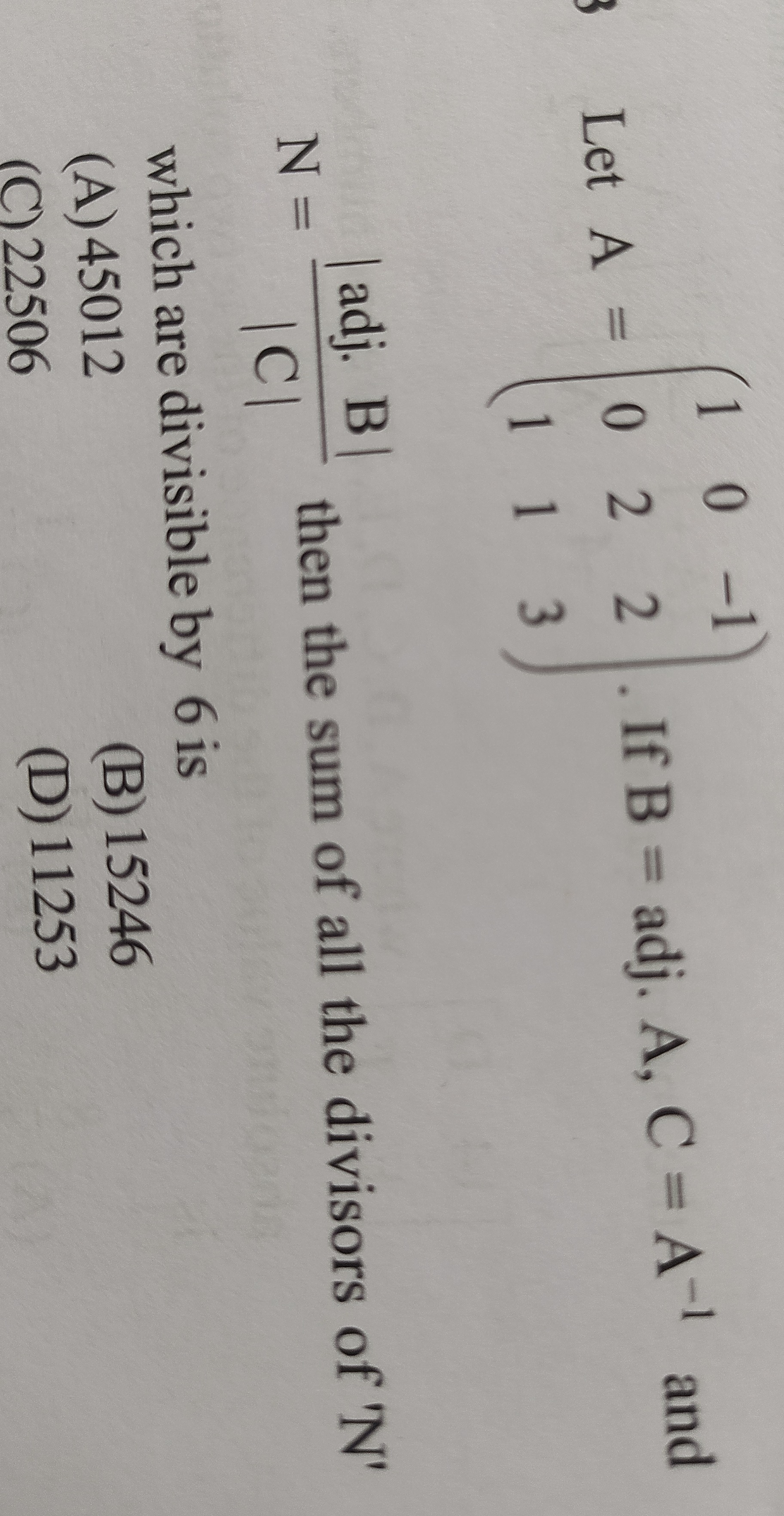Question
Question: Let $A = \begin{pmatrix} 1 & 0 & -1 \\ 0 & 2 & 2 \\ 1 & 1 & 3 \end{pmatrix}$. If B = adj. A, C = A$...
Let
A=101021−123. If B = adj. A, C = A−1 and
N=∣C∣∣adj.B∣ then the sum of all the divisors of 'N' which are divisible by 6 is

45012
15246
22506
11253
22506
Solution
Let A=101021−123. We are given B=adj. A and C=A−1. We need to calculate N=∣C∣∣adj. B∣.
First, let's find the determinant of matrix A, denoted by ∣A∣. ∣A∣=101021−123 Expanding along the first row: ∣A∣=1⋅2123−0⋅0123+(−1)⋅0121 ∣A∣=1⋅(2⋅3−2⋅1)−0+(−1)⋅(0⋅1−2⋅1) ∣A∣=(6−2)−(0−2)=4−(−2)=4+2=6. So, ∣A∣=6.
For a square matrix A of order n, we have the following properties:
- ∣adj. A∣=∣A∣n−1
- ∣A−1∣=∣A∣1
- adj. (adj. A)=∣A∣n−2A
- ∣adj. (adj. A)∣=∣∣A∣n−2A∣=(∣A∣n−2)n∣A∣=∣A∣n(n−2)+1=∣A∣n2−2n+1=∣A∣(n−1)2
In this problem, the order of matrix A is n=3. B=adj. A, so ∣adj. B∣=∣adj. (adj. A)∣. Using property 4 with n=3: ∣adj. (adj. A)∣=∣A∣(3−1)2=∣A∣4.
C=A−1. Using property 2: ∣C∣=∣A−1∣=∣A∣1.
Now we can calculate N: N=∣C∣∣adj. B∣=1/∣A∣∣A∣4=∣A∣4⋅∣A∣=∣A∣5. Since ∣A∣=6, we have N=65.
We need to find the sum of all divisors of N=65 which are divisible by 6. First, find the prime factorization of N: N=65=(2×3)5=25×35.
A divisor of N is of the form d=2a×3b, where 0≤a≤5 and 0≤b≤5. A divisor d is divisible by 6 if it is divisible by both 2 and 3. This means the exponent of 2 in its prime factorization must be at least 1, and the exponent of 3 must be at least 1. So, the divisors of N divisible by 6 are of the form 2a×3b, where 1≤a≤5 and 1≤b≤5.
The sum of these divisors is the sum of all terms 2a×3b for a∈{1,2,3,4,5} and b∈{1,2,3,4,5}. This sum can be factored as the product of two sums: Sum =(∑a=152a)×(∑b=153b).
Calculate the first sum: ∑a=152a=21+22+23+24+25. This is a geometric series with first term 2, common ratio 2, and 5 terms. Sum =2−12(25−1)=12(32−1)=2×31=62.
Calculate the second sum: ∑b=153b=31+32+33+34+35. This is a geometric series with first term 3, common ratio 3, and 5 terms. Sum =3−13(35−1)=23(243−1)=23×242=3×121=363.
The sum of all divisors of N divisible by 6 is the product of these two sums: Sum =62×363. 62×363=62×(300+60+3)=62×300+62×60+62×3 =18600+3720+186 =22320+186=22506.
The sum of all divisors of 'N' which are divisible by 6 is 22506.
Comparing this value with the given options: (A) 45012 (B) 15246 (C) 22506 (D) 11253
The calculated sum matches option (C).
The final answer is 22506.
Solution:
- Calculate the determinant of matrix A: ∣A∣=6.
- Determine the value of N using the properties of determinants of adjoint and inverse matrices: N=∣C∣∣adj. B∣=∣A−1∣∣adj. (adj. A)∣. For a 3x3 matrix A, ∣adj. (adj. A)∣=∣A∣4 and ∣A−1∣=∣A∣1. Thus, N=1/∣A∣∣A∣4=∣A∣5=65.
- Find the prime factorization of N: N=65=25×35.
- Identify the form of divisors of N that are divisible by 6. These are divisors d=2a×3b where 1≤a≤5 and 1≤b≤5.
- Calculate the sum of these divisors. The sum is given by the product of the sum of powers of 2 from 21 to 25 and the sum of powers of 3 from 31 to 35. Sum of powers of 2: ∑a=152a=2+4+8+16+32=62. Sum of powers of 3: ∑b=153b=3+9+27+81+243=363.
- The required sum is the product of these two sums: 62×363=22506.
The final answer is 22506.
